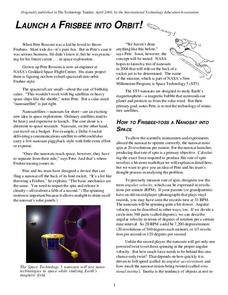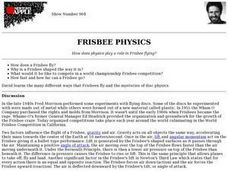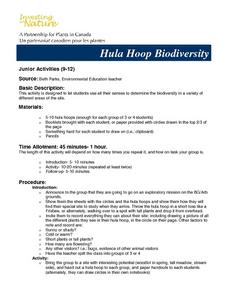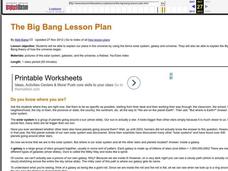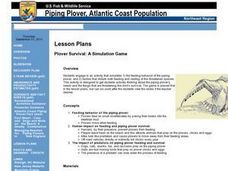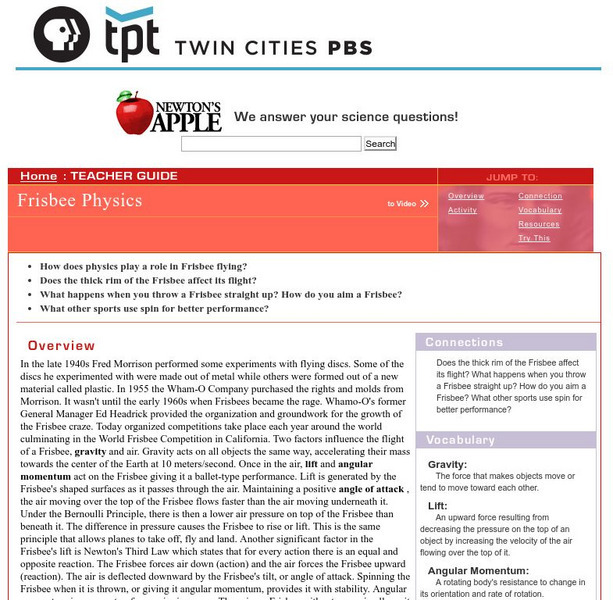International Technology Education Association
Launch a Frisbee into Orbit!
How fun it must be to play Frisbee in space! That is just what a NASA engineer gets to do, and you can learn how, too. Follow the instructions provided in this informational article to create your own satellite launcher. Afterward,...
Curated OER
Frisbee
Students examine the history behind the frisbee and how Bernoulli's principle and Newton's law plays a role. In this flight lesson plan students complete an experiment on how the rim of a frisbee effects flight.
Curated OER
Aerobic Frisbee Golf
Students work cooperatively to accurately throw a Frisbee in order to learn about fitness components and different systems of the human body.
Curated OER
Frisbee Physics
Young scholars explain how a Frisbee flies, why it's shaped he way it is and how fast and how far the Frisbee can go.
Curated OER
Aerobic Frisbee Golf
Learners work cooperatively as a team and accurately throw a Frisbee. In addition, students explore fitness components and different systems of the human body.
Curated OER
Round and Round-The Water Cycle
Young scholars explore the water cycle. In this earth science lesson, students work in small groups to read various books on the water cycle and take notes on chart paper. Young scholars share their notes and teach a younger audience...
Curated OER
Mrs. Frisby and the Rats of NIMH
Fifth graders enjoy learning more about animals and their habitats as they explore the Internet sites in these Student Activities based on the main characters in Mrs. Frisbee and the Rats of NIMH.
Curated OER
Momentum and Energy
Students study how to calculate momentum, kinetic, and potential energy. They apply each form of energy to real world situations including demonstrations, watching videos, and designing a Power Point presentation. They investigate in...
Curated OER
How Can You Tell One Clear Gas From Another?
Fifth graders perform experiments to determine the identity of an unknown gas sample. In this chemistry lesson, 5th graders fill balloons with air, oxygen, hydrogen, and carbon dioxide. They use mass and reactivity to identify the gases.
Curated OER
The Spin Doctor Is In
Students are introduced to rotational inertia with some example of objects that rotates: Throw a Frisbee acroos the field and it rotates as it moves. The same is true for a baseball and a football. The two motions, translational and...
Curated OER
The Wright Stuff
In this lesson, students design an exhibition on the history of aviation for a science museum. For homework, they write short stories envisioning the future of flight in the year 2014.
Curated OER
Using Logic
In this using logic worksheet, students are given a variety of methods used to solve problems based on logic. They read about cause and effect relationships and finding solutions to problems. They are given three problems to solve using...
Curated OER
Aviation, Aeronautics and Aerodynamics
Students investigate the physics of flight through various experiments. In this physics lesson, students construct different flying objects. They explain the dynamics that make these object fly.
Curated OER
Hula Hoop Biodiversity
Students determine the biodiversity in a variety of different areas. They record everything they can about their site- including drawing a picture of all the different plants they see in their hula hoop, in the circle on their page.
Curated OER
Gravity
Fourth graders discuss the myth of Galileo's experiments in which he threw items out the leaning Tower of Pisa to find out how fast they fell and predict what they think could happen when the two items listed on the same line are dropped...
Curated OER
The Spin Doctor Is In
High schoolers are given the difintion of translational motion, which is the object in motion stays in motion. If you are in a car and the car stops, you keep moving. They then discuss rotational motion, which is a spinning object...
Curated OER
Art to Zoo: Kiting Up The Sky: The Vehicles of Understanding
Students gain perspective on the importance of kites by reading about and discussing how kites have been used throughout history. In this kite exploration lesson plan, students follow instructions to construct a kite to assist them in...
Curated OER
The Big Bang
Students explore our universe. In this solar system instructional activity, students gain knowledge about the solar system, galaxy, the universe and the Big Bang Theory. Students watch videos and view a slideshow.
Curated OER
Plover Survival: A Simulation Game
Seventh graders engage in a simulation that explains the feeding behavior of the piping plover and the things that disturb the feeding and nesting of this species.
Curated OER
PROJECTILE MOTION
Students measure muzzle velocity, and predict range of a projectile device. In this motion lesson students complete a lab and explain the outcomes of their experiments.
Curated OER
Principles of Flight
Fourth graders study flight and compare various flights. In this measurement lesson students complete a lab activity and record measurements.
Science Buddies
Science Buddies: The 'Ultimate' Science Fair Project: Flying Disk Aerodynamics
Tossing a Frisbee with your friends is a great way to have fun in the sun. As you practice your throws and become more accurate, you're learning about the aerodynamics of Frisbee flight intuitively. You're learning the body mechanics...
Science Buddies
Science Buddies: Why Do Aerobie Flying Rings Go So Much Further Than Frisbees?
Use the instructions from this Science Buddies project to develop your hypothesis on whether flying rings fly farther than flying disks. The Science Buddies project ideas are set up consistently beginning with an abstract, objective, and...
PBS
Newton's Apple: Frisbee Physics
This teacher's guide from Public Television's Newton's Apple discusses and illustrates the physics principles governing the flight of a frisbee. Includes teacher lesson plans, activity ideas, discussion questions, and information about...


